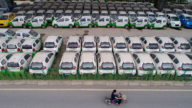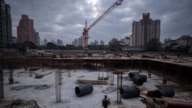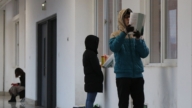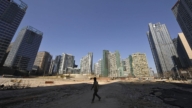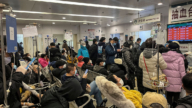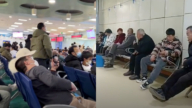【新唐人2012年10月23日訊】中共國務院副總理李克強,18號親自主持「擴大營業稅改徵增值稅」試點工作座談會,他在會上強調,「營改增」是推動製造業升級、解決服務業發展滯後的重要措施。他還表示,將增加試點行業,進一步擴大減稅規模至全國。那麼,大陸的中小企業對這項減稅措施又抱持甚麼看法呢﹖下面我們一起來了解。
所謂的「營改增」,就是原先繳納「營業稅」的交通運輸業和服務業,比照貿易或製造業繳納「增值稅」,企業過去不能扣抵的營業稅發票在實施「營改增」後,可作為進項扣抵,減少納稅額,被認為是減稅利多。
北京師範大學MBA導師段紹澤:「(服務業)過去的營業稅,是按實際情況服務的總價、總稅,也就是說,只要這個服務存在,不管有沒有利潤,都要交稅。服務業營業稅裡面有很多的重復收稅,加重了服務業的稅收(繳稅)負擔。這個稅收不合理啊。」
北京師範大學MBA導師段紹澤向《新唐人》舉例解說,譬如,旅行社帶旅遊團,到飯店用餐要繳稅,到景點區觀光買門票要繳稅﹔又譬如,汽車廠買零件、鋼材、玻璃、輪胎都要分別繳稅。因而增加了產品的總售價。
段紹澤:「如果改成增值稅就不一樣了。一個商品、一個服務,不管它流轉多少次,前面每個環節的稅,都可以在後面的任何一個環節抵扣、抵消﹔不管周轉多少環節,它的稅率加起來是一樣的。第二,增值稅只要是沒有利潤、沒有增值,就不收稅。而營業稅,只要有一次買賣就要繳稅,它周轉的環節越多它稅越多。」
目前,「營業稅改徵增值稅」已在上海實施。從8月起,試點擴大到包括北京、天津、江蘇等多個省、市。未來,將在全中國範圍內實施。但並非每個中小企業都認同這項稅制改革。
「北京大軍經濟觀察研究中心」主任仲大軍指出,北京的企業7月份就開始到國稅局辦轉移手續,直到十一之前才把手續辦好,勞師動眾。一旦,在全國實施,不知要耗費多少人力、物力,可能要浪費人民幣幾個億。
仲大軍:「願意降低點稅收,就把營業稅降低兩個點就是了,來回折騰甚麼。我都不知道上面怎麼測算出有利於服務業的發展。反正這幫官員一拍腦袋,他們想怎麼說就怎麼說,搞得下面的企業一天到晚的折騰、添亂。我們原來是在地稅(地方稅務機關)交營業稅,現在通通都轉到國稅局交增值稅。」
大陸官方預估,「營改增」實施範圍擴及全中國後,年稅收淨減少人民幣1,000億人民幣以上。大陸稅務官員日前也表示,預計「營改增」全面實施後,服務業的增長可望提高GDP 零點五個百分點。
中國中小企業溫先生:「營業稅改成增值稅主要是針對服務行業。減稅具體的方法,稅現在是17%,直接下降幾個點,對我們中小企業會幫助比較大。」
雖然服務行業中間環節成本一旦下降,將刺激下游的生產製造業,產品價格會下降,但溫先生認為,這對生產企業的幫助不大。
溫先生:「而且,另外一個,改革之後,實際的結果我們沒看到社會的物價在下降。因為,通貨膨脹比較厲害。所以,實際上,整個社會(物價)沒有起到降價的作用。所以,我們看,他還是為了刺激經濟的發展,並不是為了製造企業的降低成本,不是這麼一回事 。」
據報導,目前,大陸「營改增」適用行業包括,動產租賃業、交通運輸業和研發技術服務業、資訊技術服務業、文化創意服務業、物流輔助服務業、鑒證諮詢服務業等。
採訪編輯/梁欣 後製/李月
How is the 『Expansion of Sales Tax Change to VAT』?
On October 18, Chinese Communist Party (CCP)
Vice Premier Li Keqiang personally presided over the “Expansion of Sales Tax Change to VAT” pilot forum.
He stressed at the meeting that it is an important strategy
to promote the manufacturing industry, as well as resolve the issue of the lagging service industry.
He also said there will be more pilot places
to further expand tax cuts to the whole country.
What is the reaction of Chinese small and medium
sized enterprises (SME’s) on these tax cuts?
In this strategy, transportation and service sectors, which
used to pay sales taxes, will concert to paying VAT tax.
Purchasing receipts that previously could not be
deducted, can be deducted in the VAT program.
Thus, the taxable amount is reduced and enterprises
will pay less tax, and have higher profits.
Duan Shaoze, Beijing Normal University MBA mentor:
“The service sector in the past was taxed over the total amount.
Business must pay tax as long as there
was service, whether profitable or not.
There were many duplicate taxes in the service
sector, which aggravated tax burdens of the sector.
It was unreasonable."
When speaking to NTD, Duan Shaoze gave the example
of tour companies taking tour groups to eat at restaurants or sightseeing, and that they need to pay tax.
Another example is vehicle plants selling parts,
such as steel, glass, or tires. They will pay tax.
The total taxable amount was increased.
Duan Shaoze: “It would be different after changing to VAT.
Tax already paid over one product or one service is deducted
afterward, no matter how many times it is transacted.
No matter how many times it was
circulated, the tax rate is the same.
Moreover, if there is no profit, there will be no tax, compared
with sales tax, which people pay as long as there is transaction.
The more it was transacted, the more tax people pay.”
Currently the “sales tax change to VAT”
has already been implemented in Shanghai.
Since August, it has been expanded to many places,
include Beijing, Tianjin and Jiangsu Province.
In the future, it will be implemented across China.
But not all SME’s agree with this reform.
Beijing Dajun Economic Observer Research Center
Director Zhong Dajun highlights that
enterprises in Beijing began in July,
to register for the transfer at the National Tax Office.
The procedures were not completed until October 1.
It involves so many people and a lot of effort.
Once implemented all over the country, he does not know
how much man power, resources and money will be wasted.
Zhong Dajun: “If the government is willing to reduce tax,
it can lower the tax rate. Why does it make a big deal?
I do not know how those top people predict the benefits.
The officials just say whatever they want to.
Businessmen have to follow up in the mess.
We used to pay sales tax at the local offices.
Now we must go to the National Tax Office to pay VAT.”
The prediction by Chinese officials is that after
VAT is implemented in China, the yearly tax income will reduce by 100 Billion RMB.
Chinese tax officials expressed recently that
the service industry will increase, and will bring up 0.5% of GDP, after VAT is implemented nationwide.
Mr. Wen, SME owner: “Sales tax changing
to VAT mainly targets the service sector.
If the 17% tax rate is reduced several
points, it will help us SME a lot.”
Although the cost reduction of the service sector
will stimulate manufacturing and reduce prices,
Mr. Wen does not think it will help manufacturing.
Mr. Wen: “In addition, after the reform, we do not
see the price decline, because inflation is serious.
Therefore, we see the purpose is to stimulate
the economy, not to reduce cost for manufacturers.”
It is reported that at present, tax reform applies
to sectors such as leasing, transportation, R&D,
technology consulting, cultural & creative services,
logistics, and verification consulting.






